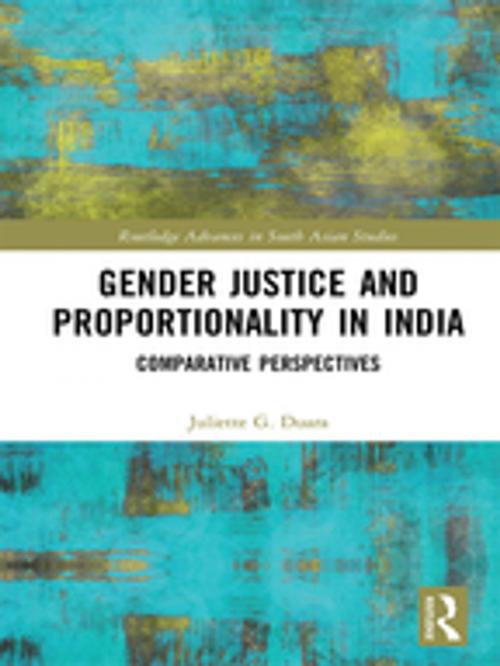Gender Justice and Proportionality in India
Comparative Perspectives
Nonfiction, Social & Cultural Studies, Social Science, Cultural Studies, Ethnic Studies| Author: | Juliette Gregory Duara | ISBN: | 9781351782616 |
| Publisher: | Taylor and Francis | Publication: | October 6, 2017 |
| Imprint: | Routledge | Language: | English |
| Author: | Juliette Gregory Duara |
| ISBN: | 9781351782616 |
| Publisher: | Taylor and Francis |
| Publication: | October 6, 2017 |
| Imprint: | Routledge |
| Language: | English |
For a judiciary in a democracy, dispensing justice is not only about doing justice, but also about showing that justice is being done; it is about giving reasons and creating a "culture of justification". The question becomes how to nurture such a culture. A number of liberal democratic jurisdictions have answered this question in part with the adoption of the multi-step method of evaluating the constitutionality of legislative infringements on fundamental rights widely known as Proportionality Analysis. Under Proportionality Analysis courts must engage in a structured process of reasoning.
This book deals with Gender Justice and Proportionality Analysis in India. The author argues that the Supreme Court of India should consider adopting Proportionality Analysis for the adjudication of the fundamental right to sex equality in Indian courts. The book includes an analysis of Canadian and South African Proportionality Analysis and makes some suggestions on how an Indian Proportionality Analysis could be generated using this comparative investigation. Additionally, the book proposes ways of applying the effects of socio-political context on doctrine, as well as doctrine’s interpretive impact on adjudicated outcomes for gender, thus making a contribution to feminist jurisprudence. Finally, the author analyses Indian gender equality jurisprudence, demonstrating the inadequacies of the current doctrinal framework for achieving the goal of substantive gender equality and suggesting ways in which an Indian Proportionality Analysis might be fashioned to address these inadequacies.
A novel examination of the gender situation in India in comparative perspective, this book will be of interest to academics in the field of Gender Studies, Asian and Comparative Law and South Asian studies.
For a judiciary in a democracy, dispensing justice is not only about doing justice, but also about showing that justice is being done; it is about giving reasons and creating a "culture of justification". The question becomes how to nurture such a culture. A number of liberal democratic jurisdictions have answered this question in part with the adoption of the multi-step method of evaluating the constitutionality of legislative infringements on fundamental rights widely known as Proportionality Analysis. Under Proportionality Analysis courts must engage in a structured process of reasoning.
This book deals with Gender Justice and Proportionality Analysis in India. The author argues that the Supreme Court of India should consider adopting Proportionality Analysis for the adjudication of the fundamental right to sex equality in Indian courts. The book includes an analysis of Canadian and South African Proportionality Analysis and makes some suggestions on how an Indian Proportionality Analysis could be generated using this comparative investigation. Additionally, the book proposes ways of applying the effects of socio-political context on doctrine, as well as doctrine’s interpretive impact on adjudicated outcomes for gender, thus making a contribution to feminist jurisprudence. Finally, the author analyses Indian gender equality jurisprudence, demonstrating the inadequacies of the current doctrinal framework for achieving the goal of substantive gender equality and suggesting ways in which an Indian Proportionality Analysis might be fashioned to address these inadequacies.
A novel examination of the gender situation in India in comparative perspective, this book will be of interest to academics in the field of Gender Studies, Asian and Comparative Law and South Asian studies.















![Cover of the book Face[t]s of First Language Loss by Juliette Gregory Duara](https://www.kuoky.com/images/1999/april/300x300/9781135671037-zKbf_300x.jpg)